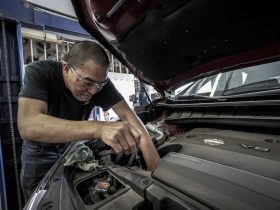Upgrading to a new car is a major life investment that requires much consideration. Ideally, personal vehicles should last for more than eight years with proper and consistent maintenance. While it’s perfectly fine to use your vehicle up to its last breath, there are many unexpected circumstances which might push you for an upgrade.
If you’re looking for an upgrade, brands like Kia are your best options because of their competitive and up-to-date models. Here are the top six reasons why you might want to upgrade your car, and some ways in which you can benefit from it:
1. Boost Reliability
As technology is constantly improving, so is vehicle manufacture. Most of today’s cars are much more reliable than those in the 1900s. Particularly, redesigned models whose development has been strongly influenced by user scrutiny tend to be the most reliable.
Although, when shopping for a new car, age isn’t everything. According to Consumer Reports, new cars aren’t always completely reliable, and you should always factor in things such as safety and cost-efficiency.
2. Take Advantage of Fuel Efficiency
In terms of fuel efficiency, driving 15,000 miles with an old car will require approximately 500 gallons of gas, but a newer vehicle can do this with only 375 gallons.
Engine components react more aggressively with one another as they age, thus increasing the likelihood of larger emissions. If you’ve noticed that your car is using up more fuel than before albeit the same mileage, it’s worth considering a new car to avoid increased gas expenses.
3. Upgrades In Safety Features
Safety is the most important feature that your car should possess during its years of use. As a car owner, you should prioritize your safety while driving, as well as that of your passengers and other road-users. New cars are equipped with exceptional safety features that most outdated models don’t have, and there’ll be even more safety features in the future.
Some of the latest safety features in cars today include:
- Automatic emergency braking
- Lane-keeping assist
- Automatic high-beam headlights
- Blind-spot detection and warning
- Forward collision warning
- Backup cameras
- Adaptive cruise control
4. Changes In Lifestyle
It is essential that your car suits your lifestyle. If you’ve had a significant change in lifestyle and a new kind of car would be more convenient, then you shouldn’t hesitate to invest in one.
If you’re looking into building your own family, it’s crucial that your car has enough space for your partner and children, and that it has sufficient safety features. If you need to travel further distances than before, then you’ll be in higher need of comfortable seats and road-appropriate tires, which your current car might not possess.
5. Too Many Necessary Repairs
Does your car frequently need repairs and maintenance? You don’t want to have that kind of financial and safety worry in the passenger seat while you’re driving. Instead of having costly repairs consistently, you should consider purchasing a new vehicle altogether, which shouldn’t need repairs for a good deal of time after you’ve bought it. Repairs are only necessary after long usage, assuming you don’t get in any accidents.
6. Improve Credit Score
This reason might be an unlikely one, but upgrading to a new car could improve your credit score. Your car loan application can be viewed by other lenders, and your timely payments will reflect well on your credit history.
As long as you pay your car loan on time, you can build a positive credit history which will help you in the future.
Upgrading Is All About The Right Timing: Final Thoughts
Once you’ve finalized your decision to upgrade to a new car and to sell your old one, you can make the most from this transaction through picking the perfect time to make the change. If your old car is still in good shape for its age, you should sell it while it has some warranty left. Generally, about 12 to 18 months of warranty is a good amount to increase your car’s market value for trade-in or selling.
Furthermore, the potential terms of the sale of your old car might stop you from upgrading. As a rule of thumb, your car’s estimated selling price should be more than your payout figure, or the remaining amount left to pay on your car loan. It’s better to still have some money leftover from the selling price to deposit into your new car. However, if you’re looking into doing this, it’s always best to consult your loan provider about it first.







